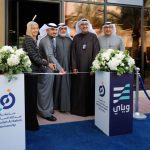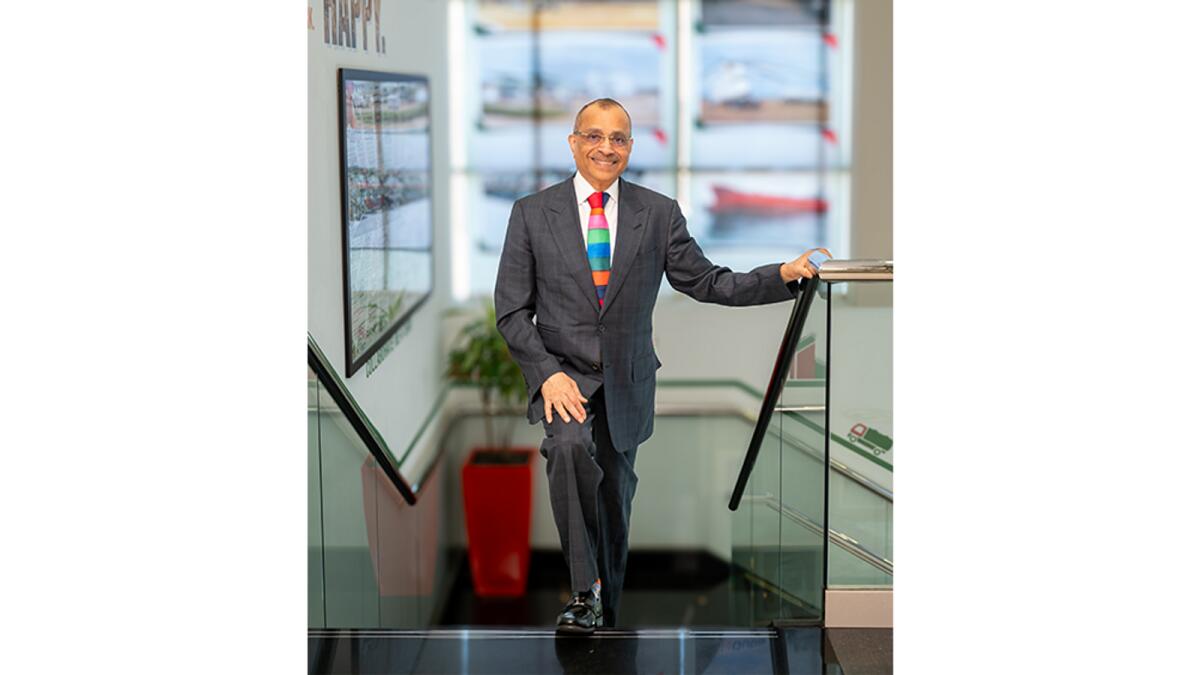Eugene Mayne, Founder and Group CEO of Tristar Group, will continue to explore new markets and focus on growing shareholder value
By Muzaffar Rizvi
In the late 1990s, Eugene Mayne, an oil and gas veteran with two decades of experience, identified a critical need for safe and reliable road transport services for the UAE’s mushrooming petroleum sector.
With a unique mix of industry insights and cautious ambition, he established Tristar as a small business in 1998. Fast forward 25 years, and this company has transformed into a global powerhouse in energy logistics, on the back of its key partnerships, strategic acquisitions, and long-term contracts.
“Today, the Tristar Group’s operations now span 30 countries and territories across the Middle East, Africa, Asia, the Pacific, the Americas, and Europe. From modest beginnings as a small UAE road transport service, the company has expanded its services into four distinct business segments Road Transport and Warehousing, Maritime Logistics, Fuels, and Fuel Farms – serving the world. Services include transport, storage, retail, and distribution, on the road and at sea,” Mayne, Founder and Group CEO of Tristar Group, told BTR during an interview.
The Tristar Group has more than 2,000 road transport assets and 30 maritime vessels to cater to the needs of major businesses in the downstream oil and gas industry. It is a fully integrated Logistics Solutions provider that offers a comprehensive list of services to cater to the needs of the petroleum, chemical and petrochemical industries, both in the region and globally.
“Tristar operates to the highest international standards of health, safety, operational excellence, environmental stewardship, and regulatory compliance, and continues to be recognised with wide-ranging accolades and awards,” he said.
Tristar has been a member of the International Air Transport Association’s (IATA) strategic partnership programme since 2008, and a member of the Joint Inspection Group (JIG) since 2019. JIG is a global standard guiding body for implementing best practices in the aviation industry.
Trusted Global Partner
Mayne said Tristar has been consistently delivering strong financial results, with an impressive double-digit annual compound annual growth rate, which has further solidified the group position as a trusted global partner, especially with oil majors, national petroleum companies, and Inter-governmental Organisations (IGOs).
He said the group recorded a 31 per cent increase in consolidated revenues which rose to Dh4 billion, while ‘earnings before interest, taxes, depreciation and amortisation’ increased 29 per cent to touch Dh812 million as of December 2023. He attributed growth in revenue to the fuel farms and maritime business segments, and said the company also benefitted from a majority stake in Aquarius Energy (formerly HG Storage International), a firm that Tristar acquired 51 per cent stakes in August 2022.
“Beyond the immediate future, Tristar is currently engaged in serious negotiations for various blue-chip projects around the world, in collaboration with oil majors. When these come to fruition, it will undoubtedly ensure long term financial and environmental sustainability as the company looks to balance its growth ambitions with a blend of conventional and green fuel opportunities,” he said.
Looking ahead to the next five to 10 years, he said Tristar will continue to focus on growing shareholder value, while staying “true to our core values of integrity, safety, and sustainability”.
Integrated Business Model
The founder of the Dubai-headquartered conglomerate said Tristar has established long standing relationships with a vastly diversified and truly international blue-chip customer base due to its integrated business model offering value proposition through designing, building, and operating integrated energy logistics services.
“This fully integrated model is able to capture maximum wallet share of fuel logistics spend, especially that of the oil majors. We are responding to market needs and tapping into emerging business opportunities that has helped the group to grow its portfolio from road transport services to maritime and cryogenics logistics, specialised warehousing, fuel farm management, commercial aviation refuelling, chemicals and lubricants distribution, and turnkey fuel supply operations,” he said.
Exploring New Markets
Mayne said Tristar continues to explore entry into new markets with new services that include but not limited to electric vehicles, biofuels, hydrogen fuel cells, and renewable energy.
“A large part of our growth stems from providing best-in-class services to our core customers and leveraging the ‘partner of choice’ relationships we enjoy with them. We have always maintained keen focus on cost control and operational excellence, and teams across all our business segments continue to build momentum on these platforms,” he said.
To a question, the Group CEO of the global energy logistics company said Tristar has a strong presence in the region and it will continue to capitalise on business opportunities across its key growth markets.
“With a view to expand our presence in the wider Middle East, we are studying near-term expansions in Saudi Arabia, and new opportunities in the wider Middle East. We have built strong international partnerships which gives us greater ability, scalability, and flexibility. We look forward to harnessing these advantages to benefit the region’s economies,” he said.
“Tristar will enter the Sri Lankan fuel retailing market later this year as the Shell brand, as per an agreement between Shell Brands International AG and RM Parks (Private) Limited,” he added.
RM Parks (Private) Limited is a partnership between the Tristar Group and RM Parks, an experienced distributor of Shell fuels in the North American fuel retailing market. It secured a contract by the Sri Lankan Ministry of Petroleum and Energy in 2023 to operate 150 retail fuel stations across Sri Lanka for an initial period of 20 years, all of which will be rebranded to Shell.
Strong Presence In Africa
The oil and gas veteran said Tristar has been active in the African continent’s fuel and aviation sectors for close to 20 years. It has a strong presence in Kenya, Uganda, Tanzania, South Sudan, Sudan, Mali, Central African Republic, Somalia, Democratic Republic of Congo (DCR) and Liberia.
Elaborating, he said Tristar’s entry into Africa’s aviation sector started in 2007 with a contract to provide fuel storage and aircraft refuelling services to an IGO that oversees peacekeeping and humanitarian missions in Africa.
“Steadily building up this service portfolio, the company soon became a reliable and dependable partner for the IGO and many of its associated agencies, with the ability to provide them air connectivity, by building and operating aircraft refuelling infrastructure at remote regions that have no road connectivity,” he said.
“We operate more than 62 military and commercial airports across Africa, that jointly fuel an average of 100 aircrafts per day,” he said.
Moreover, Tristar entered South Sudan’s commercial aviation sector in 2011 and now operates three sites for commercial aviation in the young nation. In Uganda, Tristar has set up a fuel farm and fuel hydrant facility at Entebbe International Airport, which it will operate for 25 years. In Bangui, Central African Republic, the group is constructing an aviation fuel depot to cater to the needs of the international airport.
“When operational, the facility will cater to the storage and refuelling requirements of the airport in full measure,” Mayne said.
He said Tristar is also actively engaged in Pan-African fuel logistics operations, including imports, the construction of fuel depots, and the storage and delivery of fuel to various organisations for their end-equipment like generators, vehicles, and aircraft.
“The company has the exclusive licence for blending and distributing Caltex lubricants across East Africa. In Kenya, the group is engaged in road transportation, warehousing, retail outlets, and lubricants blending and packaging,” he said.
HR Strategy
Mayne said Tristar operates in 30 countries and has staff from 36 nationalities with emphasis on building a diverse and inclusive workforce that also reflects many of the communities where it operates.
“While job creation is largely an organic process, the pace of growth maintained by the company has seen an annual increase of its employee count by 15 per cent to 20 per cent. In 2023, we hired close to 400 new employees, which is approximately 16per cent of the total workforce count,” he said.
With reference to nationalisation and female employees in the group, he said Tristar HR strategy is very clear and in line with the best international practices and local laws.
“We play an important role in jobs creation and offer more opportunities to women. Last year, our UAE operations increased Emirati workforce by 100 per cent of which 90 per cent were women,” he said.
In Saudi Arabia, he said the workforce grew by 25 per cent, and half of them were women. Tristar’s Oman operations comprise roughly 50 per cent of Omani nationals, he said.
“The company’s HR strategy is an integral part of its corporate values – drive sustainable growth, foster innovation, and positively impact communities. As it continues to expand operations and tap into new opportunities, there will be several additional jobs, locally and around the world,” he said.
Tristar Group has invested in contemporary technologies to streamline HR processes, optimise planning, improve data management, and enhance real-time visibility. All employee records and services are digitised, and the HR Team is exploring data analytics to gain insights into employee performance, turnover rates, and workforce trends to enable data-driven decision making and strategic planning.
“Continuous investments are made in training programmes to ensure that employees are equipped with the right skill in various technology and new generation platforms to have the right talent to enable the company to maintain a leadership position in its targeted markets. There are various wellness and leisure events and activities for employees, and assistance programmes to support their financial needs,” he said.
Sustainability Plans
Mayne emphasizes the company’s realistic approach to decarbonisation and outlines ongoing sustainability plans, including alternative fuels, hybrid vessels, electric vehicles, operational efficiency optimisation, and various biodiversity conservation projects.
In late March, Tristar became one of the first companies in the region to set internal climate targets aligned with science by applying a mix of frameworks based on the science based targets initiative as well as the Transition Pathway Initiative.
“The company ran a climate intervention modelling workshop as part of its climate journey that began in January 2024. Facilitated by a global decarbonisation consultancy, the workshop identified targets and priorities for climate goals across the company’s four business verticals in 30 countries, to shape its emissions reduction roadmap going forward,” he said.
As far as the group’s short- and long-term sustainability plans are concerned, he said Tristar has been practising, and publicly reporting on its sustainability efforts, since 2012, long before it became a prevalent business mandate.
“Energy transition initiatives such as the use of LNG fuel in shipping and biofuels in road transport and warehousing has already helped Tristar reduce its carbon footprint by a substantial amount,” he said.
In addition, he said the company has achieved an annual reduction of approximately 30MT of CO2e through behavioural change initiatives such as circularity in water and waste, reducing grid electricity consumption, switching from conventional cars to electric vehicles and using pooled transport for staff commutes.
“The solar power generating plants at the group’s premises almost negate its electricity consumption while reducing emissions significantly,” he said.
In maritime operations, Tristar’s ongoing efforts in fuel optimisation, carbon reduction and sustainability are recognised with Energy Efficiency Existing Ship Index and Carbon Intensity Indicators certifications. All its seafaring vessels adhere to International Maritime Organisation (IMO) standards and various energy-saving and emission-reducing technologies are deployed at periodic dry docks, to meet or stay ahead of regulations.
“Tristar has committed to ensure that at least five per cent of its deep-sea fleet will use zero-emission fuels by 2030 as part of the First Movers Coalition and has ordered its first hybrid electric bunkering vessel to be based in Fujairah, scheduled to be another first for the region. Other pioneering green initiatives include shore power for berthed coastal vessels, new eco-grade ships, and low power lighting and technical systems,” he said.
CSR Initiatives
Under Mayne’s stewardship, Tristar’s commitment to community engagement and social responsibility has flourished. The company has launched several programmes to enhance road safety, environmental conservation, and community well-being, reflecting Mayne’s belief in the power of business to effect positive change.
“As a responsible corporate citizen, Tristar has actively practiced CSR for many years, and were early adopters of an environmental, social and governance (ESG) framework and various diversity, equity, inclusion (DEI) policies,” he said.
“Tristar views itself as a ‘Business for Purpose’ and upholds this commitment by placing equal importance on generating profits and making positive impacts. It plays a relevant role in many communities around the world, addressing issues like education, literacy, clean water, good health and environment protection, and these social contributions are aligned with the company’s active participation in the United Nations Global Compact in 2011,” he said.
In the UAE, Tristar has maintained long-term support to Al Jalila Foundation, Emirates Environmental Group (EEG) and Mohammed Bin Rashid Al Maktoum Global Initiatives and has recurring partnerships with the Traffic Awareness Section of the Roads and Traffic Authority to promote safe driving and road safety.
Another flagship CSR event is the ‘Safety at Sea’ – Tristar’s homage to maritime workers around the world. Now entering its sixth edition, ‘Safety at Sea’ highlights the challenges and loneliness that maritime workers face and by finding solutions to mitigate their personal issues at sea.
“We continue to focus our efforts to be a responsible and sustainable business that is committed to the safety of people, planet, and communities in which we operate. Whatever guise our planned or future undertakings take, they will stay steady on this course,” Mayne concluded.
Read the full article here










